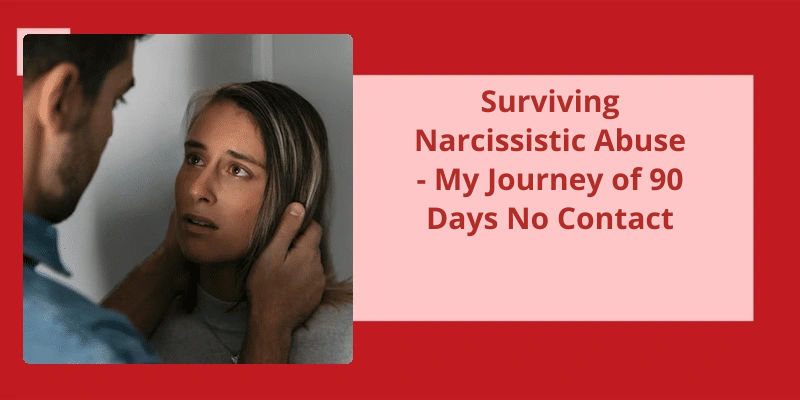Breaking free from a toxic relationship with a narcissist can be an emotionally overwhelming experience. It isn’t uncommon for victims of such relationships to feel lost, confused, and unsure of how to move forward after cutting off all contact with their abuser. The first 90 days following the end of the relationship can be particularly challenging, as this is a time for healing and rebuilding one's sense of self-worth. During this period, victims may experience a range of emotions, including anger, sadness, guilt, and anxiety, as they work to untangle themselves from their abuser's manipulative grip. Yet, by leveraging the power of self-care, setting healthy boundaries, and seeking support from trusted friends and family, survivors can begin to regain control of their lives and experience true freedom from the effects of narcissistic abuse.
How Long Will a Narcissist Go Without Contacting You?
The length of time a narcissist will go without contacting you depends on a multitude of factors such as the severity of their disorder, the amount of control they’ve over you, and their own personal schedule. It’s important to remember that narcissists aren’t capable of healthy relationships, so any period of silence should be taken as a red flag.
During this period of silence, the narcissist is often attempting to exert their power over you and make you feel as if you’re at fault for their absence. They may manipulate situations to make you believe that you’re the one who needs to apologize and seek their forgiveness.
The longer the narcissist goes without contacting you, the more likely it’s that they’re trying to punish you for perceived slights or mistakes. They may also simply be bored with the relationship and ready to move on to something or someone new.
It’s important to remember that the silent treatment is a form of emotional abuse and shouldn’t be tolerated in any relationship. If you find yourself in this situation, it’s important to seek help from a trusted friend, family member, or therapist.
Ultimately, a narcissist may go their entire life without contacting you again, as they aren’t capable of healthy, long-lasting relationships. It’s important to recognize the signs of a narcissistic personality disorder early on and take steps to protect yourself.
How to Heal From the Emotional Trauma of Being in a Relationship With a Narcissist
Emotional trauma resulting from a relationship with a narcissist can be healed by seeking professional help, setting boundaries, practicing self-care, and surrounding oneself with a supportive network of friends or family. It’s important to acknowledge and validate one’s experiences, process emotions, and work on rebuilding self-esteem and self-worth. It may take time and effort, but healing from such trauma is possible with the right support and tools.
It can be difficult to navigate the aftermath of a relationship with a narcissist. Going no contact with a narcissist may seem like the best option, but it’s important to understand that it may not necessarily be a foolproof solution. The truth is, the effectiveness of no contact largely depends on the specific narcissist in question and their underlying motivations for the toxic behavior.
Does No Contact Affect a Narcissist?
However, no contact is still recognized as the most effective way to deal with narcissists. Ignoring their advances will eventually make them lose interest in you. The key is to remain steadfast and not respond to them in any way, shape, or form. This will challenge their need for control and dominance, which is what makes them thrive in relationships whether platonic or romantic.
The impact of no contact on narcissists is dependent on a multitude of factors, including their level of narcissism, their personal maturity and self-awareness, and their existing relationships. For some individuals, no contact may be the push they need to search inside themselves and reflect on their actions. They may ultimately change their ways and become a better version of themselves.
For others, no contact may serve as an excuse for them to double down on their manipulative and toxic behaviors. They may become more aggressive in their attempts to regain control and dominance over the situation, which can be particularly dangerous for those who’ve endured emotional or physical abuse in the past at the hands of narcissists.
This means maintaining clear and consistent boundaries, avoiding engaging with them in any way, and finding support from trusted friends, family, or professionals during the difficult times. Additionally, engaging in self-care practices like exercise, journaling, or therapy can help you manage your emotions and heal from any residual trauma left from the narcissistic relationship.
There are numerous variables at play when it comes to their reactions, and it often depends on their individual personalities and circumstances. That being said, no contact remains the most effective way to disengage yourself from a narcissistic relationship and move forward with your life. It may be difficult and require significant effort, but it can ultimately lead to healthier and happier relationships in the future.
Source: 7 Things Narcissists Do When You Go No Contact
It’s important to note that not all narcissists are the same, and their behavior can vary based on individual personality traits and circumstances. However, if you’re dealing with a narcissist who’s prone to returning to their former partner, it’s essential to understand the timeline and what you can expect. So, let’s dive into the details of how long it takes a narcissist to contact you after no contact and their pattern of return.
How Long Does It Take a Narcissist to Contact You After No Contact?
However, this may vary depending on the severity of the narcissists personality traits. For some, it may take a few days or weeks to come back, while for others, it may take months or even years. The key thing to understand is that a narcissist will always come back, as they’ve an insatiable need for attention and validation from their partners.
When a narcissist does come back after no contact, they often use various tactics to lure you back into their embrace. They may start out by acting remorseful and apologizing for their past behaviors, or they may try to make you feel guilty for cutting off contact with them. Alternatively, they may use flattery and compliments to try to win you back, using tactics such as showering you with gifts and compliments.
As tempting as it may be to respond to a narcissists attempts to contact you, it’s important to remember that doing so will only feed their ego and encourage their problematic behavior. If youre serious about cutting ties with a narcissist for good, you need to stay resolute in your decision to enforce the no contact rule and stay firm in your resolve.
Instead, focus on your own healing and recovery, and try to surround yourself with positive, supportive people who can help you move past this difficult chapter in your life.
It’s important to understand their motives and behavior patterns, in order to protect yourself from their manipulative tactics. So, let’s dive deeper into the psyche of a narcissist and explore what makes them come back again.
What Makes a Narcissist Come Back Again?
Narcissists have an insatiable need for attention, admiration, and validation. They believe that they’re superior to others and deserve special treatment. When in a relationship, they’ll often manipulate and gaslight their partners to maintain power and control. However, when their partner becomes aware of their tactics and decides to end the relationship, the narcissist will feel threatened and rejected. This is a blow to their ego and self-esteem.
Coming back to their ex allows the narcissist to regain some control and feel validated again. They may also fear being alone or losing their source of supply. By returning to their ex, they can continue to extract these resources and exert power over them.
Furthermore, narcissists have a tendency to idealize their ex-partners after discarding them. They may remember the good times and overlook the negative aspects of their relationship. This can lead to them longing for their ex and believing that they made a mistake in ending the relationship.
However, when a narcissist comes back, it’s often not a genuine attempt to reconcile. They may show remorse and promise change, but this is usually just a manipulation tactic to regain control. Narcissists are notorious for their inability to change or take responsibility for their actions. They may continue to use the same tactics that led to the breakup in the first place.
Ultimately, the decision to let a narcissist back into your life is up to you. However, it’s important to recognize their behavior and motives for what they are. If you do decide to give them another chance, it’s crucial to set clear boundaries and hold them accountable for their actions. Remember that a narcissists priority is always their own needs and desires, and they’ll do whatever it takes to maintain their power and control over you.
Dealing with a narcissist’s silent treatment can be a challenging and frustrating experience. It can leave you feeling confused and helpless, wondering when the silence will break and what you can do to make it end. While there’s no set timeline for how long a narcissist will remain silent, research has shown that the average duration is about four-and-a-half days. However, it’s important to remember that the silent treatment often ends when the narcissist requires more attention and validation from their victim.
How Long Will a Narcissist Stay Silent?
It’s important to note that the silent treatment is a form of emotional abuse used by the narcissist to control and manipulate their victim. They use it to punish their victim for perceived wrongs or to gain power and control in the relationship. It can be a difficult experience for the victim to endure, as they’re left feeling isolated, confused, and helpless. It isn’t uncommon for the victim to internalize the blame for the narcissists behavior, leading to feelings of low self-worth and self-doubt.
They may also use other tactics to exert control, such as withholding affection, giving the silent treatment in public, or using the silent treatment as a way to punish their victim for perceived wrongs. It isn’t uncommon for the narcissist to manipulate the situation to make their victim feel guilty or responsible for the silent treatment.
While the length of the silent treatment can vary, it isn’t uncommon for it to last for weeks or even months, particularly if the narcissist is using it as a way to gain power and control in the relationship. This can be a particularly difficult experience for the victim, as they’re left feeling completely isolated and cut off from their partner. They may also feel responsible for the silent treatment, leading to further feelings of guilt and self-doubt.
If you’re experiencing a narcissists silent treatment, it’s important to recognize that it isn’t your fault and that you’ve done nothing wrong. It can be helpful to seek support from friends, family, or a therapist, who can help you navigate this difficult situation. It’s also important to set boundaries with the narcissist and to prioritize your own mental and emotional well-being. Ultimately, it may be necessary to leave the relationship in order to protect yourself from further abuse and manipulation.
How to Confront a Narcissist Who Is Giving You the Silent Treatment
If a narcissist is giving you the silent treatment, it’s important to approach the situation with caution and empathy. Avoid engaging in their toxic behavior and instead communicate calmly and assertively about your feelings and boundaries. It’s also important to seek support from trusted friends or professionals in dealing with a narcissistic person who’s withholding communication.
It’s important to understand the consequences of dealing with a narcissist and the best way to handle their behavior. While it may be difficult to cut off contact completely, it’s necessary for your own well-being. In this article, we will explore the reasons why a narcissist may stop contacting you and the impact it can have, as well as offer advice on how to move forward.
What Happens When a Narcissist Stops Contacting You?
It’s important to understand that a narcissist is someone who only thinks about themselves. They lack empathy and don’t care about others feelings. When a narcissist stops contacting you, it usually means that they’ve found someone else to manipulate. Narcissists can’t be alone for long periods as they need attention and admiration from someone else.
If you’ve been in a relationship with a narcissist, it can be tough to break free from the cycle. However, if you want to move on from the relationship, you need to be serious about not contacting them. This means a complete cut-off – no texting, calling, or any kind of interaction. It can be challenging, but it’s necessary for your wellbeing.
Ghosting a narcissist can also be an effective method. This means that both of you’re unable to contact or interact with each other in any way. In this scenario, the narcissist will likely move on to find someone else to satisfy their needs. It’s a harsh method, but it can be the best option if you want to leave the relationship behind.
It’s crucial to remember that there’s nothing romantic about a narcissist. They’re only interested in themselves and don’t care about your feelings or emotions. They’ll use you as long as you allow them to. Once they find someone else, they’ll discard you without a second thought.
The Signs That You Are in a Relationship With a Narcissist
- You feel like you’re walking on eggshells all the time.
- They constantly need attention and admiration from others.
- They lack empathy and are unable to understand your feelings.
- They often belittle or criticize you.
- They’ve an inflated sense of self-importance and entitlement.
- They rarely apologize or take accountability for their actions.
- They manipulate and control you through guilt or fear.
- They project their own shortcomings onto you.
- They use gaslighting techniques to make you doubt your own reality.
- You feel drained and exhausted from the constant drama and chaos.
Conclusion
In conclusion, going 90 days with no contact with a narcissist is a big accomplishment, and it's important to recognize the strength and courage it takes to break away from toxic relationships. It's common for victims of narcissistic abuse to feel a mix of emotions, such as guilt, shame, and fear, when they decide to leave the narcissist and cut off contact. However, it's crucial to remember that self-preservation and emotional healing are key to moving forward. Setting boundaries and maintaining no contact is essential in breaking free from the cycle of abuse and regaining control over one's life. It's important to seek support and therapy to help navigate the healing process and to continue to prioritize self-care. Remember, healing is a journey, not a destination, and every step towards recovery is a triumph.






